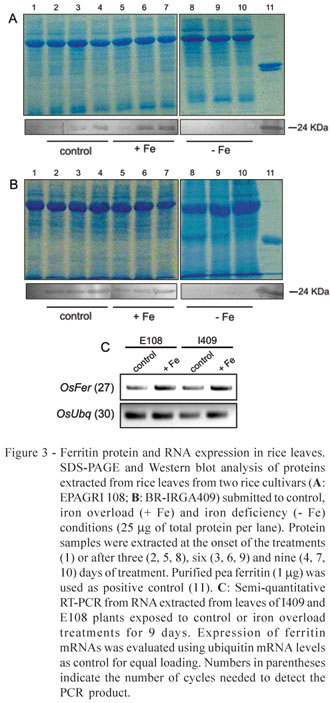Plants ordinarily face iron (Fe) deficiency, since this mineral is poorly available in soils under aerobic conditions. Nonetheless, wetland and irrigated rice plants can be exposed to excess, highly toxic Fe. Ferritin is a ubiquitous Fe-storage protein, important for iron homeostasis. Increased ferritin accumulation resulting from higher Fe availability was shown in some plant species. However, the role of ferritin in tolerance mechanisms to Fe overload in rice is yet to be established. In this study, recombinant rice ferritin was expressed in Escherichia coli, producing an anti-rice ferritin polyclonal antibody which was used to evaluate ferritin accumulation in two rice (Oryza sativa L.) cultivars, either susceptible (BR-IRGA 409) or tolerant (EPAGRI 108) to Fe toxicity. Increased ferritin mRNA and protein levels resulting from excess Fe treatment were detected in both cultivars, with higher ferritin protein accumulation in EPAGRI 108 plants, which also reached lower shoot Fe concentrations when submitted to iron overload. The tolerance mechanism to excess Fe in EPAGRI 108 seems to include both restricted Fe translocation and increased ferritin accumulation. This is the first work that shows higher accumulation of the ferritin protein in an iron-excess tolerant Oryza sativa cultivar, providing evidence of a possible role of this protein in iron tolerance mechanisms.
PIXE; anti-ferritin antiserum; metal tolerance





